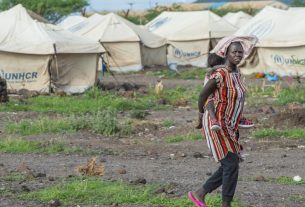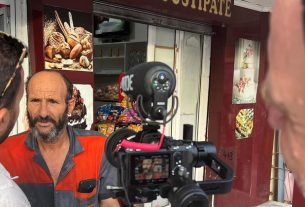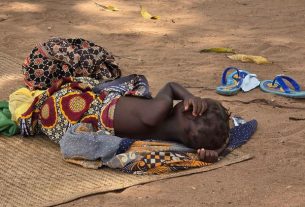Nearly three months into his job as the new human rights chief at the UN, Volker Türk has a lot on his plate.
A career UN official and human rights lawyer, mild-mannered, dapper and bespectacled, he has less name recognition than his predecessor, the former president of Chile, Michelle Bachelet. When he saw her before he started, he says, “she was very worried, and I share her worry, about how divisive human rights has become.”
Türk takes on the trickiest of jobs in an era marked by widespread concern over authoritarian governments, the climate crisis, protracted conflicts, invasive digital tools and the global cost-of-living crisis. All of which are dealing setbacks to human rights, and none of which are problems with an easy solution.
At the start of 2023, Türk is particularly worried about widespread flouting of international humanitarian law, the practical rules of the battlefield that were set out in the Geneva conventions.
Of leading concern, he says, are Yemen, South Sudan, Syria (still) and Ethiopia, where – despite a truce between government forces and Tigrayan rebels – the region of Oromia is now engulfed in violence.
Then, of course, there’s Ukraine, where the war sparked by Russia’s invasion looks set to grind on for years. Last month, the UN’s human rights monitoring mission, which reports to Türk’s office, accused Russian forces of carrying out summary executions across the regions of Kyiv, Chernihiv and Sumy earlier this year that it said may constitute a war crime.
“In any conflict situation, the longer it lasts, the more you disrespect the other, and that goes to the heart of international humanitarian law,” says Türk. “The fact that in winter time in Ukraine you have critical civilian infrastructure bombarded, where people then end up with no heating or electricity … is an indication of that.”
On a recent visit to Kyiv, Türk was forced to hold a meeting with human rights defenders in an underground shelter as the sirens sounded. The people he was with told him: “Oh, this is the new normal for us.” Türk says now: “The fact that something that is utterly abnormal becomes normal is frightening. You get used to a situation that no one should get used to.”
In Ukraine, he was struck – as he says he always is in war zones – by “the destruction … the senselessness of it”. “I can never get used to the fact that war brings out the worst everywhere,” he says.
As a child growing up in Austria, he was baffled by how the second world war had done just that. “I was wondering: why is it that there was almost an indifference [to the suffering of others] that became violent?”
Türk, who has spent most of his career at the UN’s refugee agency in countries such as Malaysia, Kosovo and the Democratic Republic of Congo, seems to have retained this aversion to indifference, except now he thinks of it on a global scale. Perhaps as a result of Ukraine, many other crises, he notes, are being forgotten – or, at least, not given the attention they deserve. From Myanmar and Sri Lanka to Haiti and Somalia, he fears, those curtailing the rights of others will be emboldened if the world looks the other way.
“If [these situations] continue to be forgotten, those who benefit from it probably feel encouraged. So it is important that we keep the spotlight on [them],” he says.
One thorny human rights issue that Türk’s office could not forget, even if it wanted to, is China’s treatment of the Uyghurs and other ethnic and Muslim minorities in the western region of Xinjiang. After a long delay, during which Bachelet was accused of bowing to pressure from Beijing, she published the OHCHR report in the summer, just 11 minutes before she left the job.
A damning review, it found that Uyghur Muslims were suffering “serious human rights violations”, possibly amounting to crimes against humanity. But the relief felt by activists that the UN had not minced its words was soured soon afterwards when its human rights council – an inter-governmental body made up of 47 rotating member states – voted in October against holding a debate on the issue after intense lobbying by Beijing.
Agnès Callamard, secretary general of Amnesty International, said the move made “a mockery of everything the … council is supposed to stand for”.
Is there a credibility problem here? Türk insists that a distinction must be made between the bodies of the UN – including the security council, which, he says, has proved “pretty dysfunctional” on a number of issues, not least Ukraine – and offices such as his own. “For me, despite the fact that the human rights council has decided not to go ahead with it … it is a report that I feel duty bound to follow up on,” he says.
Doing so will require “continued dialogue” with the Chinese authorities, he adds, and on this he knows he must tread carefully. The Xinjiang issue came to dominate Bachelet’s time in office, culminating in a heavily criticised visit to the country, which critics branded a PR coup for Beijing.
Despite the furore, Türk is quick to defend his predecessor: “It was right for her to go and engage … China is a very important country. We need to engage and we need to work with them.”
If invited, would he go to talk to the Chinese about the contents of the 46-page OHCHR assessment? “If I can discuss the report, and if that’s absolutely clear, yes, I would,” he says.
This year will mark the 75th anniversary of the signing of the Universal Declaration of Human Rights. Türk imbibed the text as an idealistic teenager in Linz, Austria, and has carried round his now battered copy throughout his career.
The UN is planning a year-long campaign to showcase the declaration, focusing on its legacy and relevance.
Türk hopes that, amid the turmoil and division of recent years, it will help “bring us back to some of the basics”.
“[The declaration] is underpinned by fundamental human values that cut across the whole world: all continents, all religions, all faith groups, all belief systems, all culture. They are nourished by these fundamental human values, and the human rights norms emanate from them,” he says. “I think we need to bring [the human rights conversation] back to it.”


